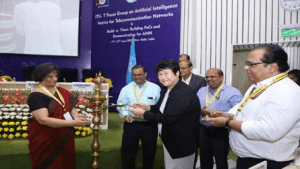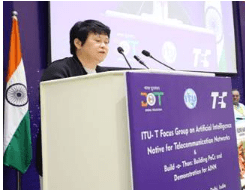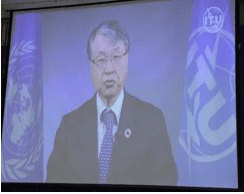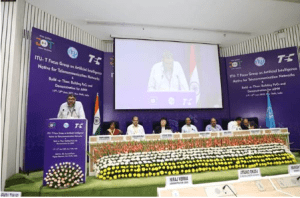New Delhi: In a transformative move toward the future of telecom innovation, India hosted the third meeting of the International Telecommunication Union (ITU) Focus Group on Artificial Intelligence Native for Telecommunication Networks (FG-AINN) in New Delhi from June 11–13, 2025. This high-level global event marks a significant milestone in India’s commitment to advancing AI-native telecommunication networks, emphasizing intelligent, autonomous, and real-time optimized systems that will shape next-generation digital infrastructure. Organized by the Telecommunication Engineering Centre (TEC), the technical arm of the Department of Telecommunications (DoT), the three-day event witnessed key announcements, strategic collaborations, and expert-led discussions on the convergence of AI and telecom.
AI-Native Networks at the Forefront of Global Innovation:
 At the inaugural session, Mr. Sanjeev Bidwai, Member (T), DCC, highlighted the emerging dominance of AI-Native Networks (AI-NNs) in telecom design. These networks reflect a radical transformation—from traditional, rule-based infrastructure to self-managing, intelligent systems guided by AI orchestration, automation, and optimization.
At the inaugural session, Mr. Sanjeev Bidwai, Member (T), DCC, highlighted the emerging dominance of AI-Native Networks (AI-NNs) in telecom design. These networks reflect a radical transformation—from traditional, rule-based infrastructure to self-managing, intelligent systems guided by AI orchestration, automation, and optimization.
India showcased its national AI ambitions, including the ‘Bharat Gen’ project—India’s first AI-based, multimodal Large Language Model (LLM) designed for Indian languages, along with AI-driven initiatives spearheaded by premier institutes like IITs and C-DOT, targeting network automation and digital twin technologies. Mr. Bidwai also emphasized the need for ethical and inclusive deployment of AI, underscoring digital sovereignty, explainability, and trust as foundational values.
In his video address, Mr. Seizo Onoe, Director, ITU-T, reiterated the revolutionary potential of AI-native systems to achieve next-gen performance standards, including real-time network adaptation, fault detection, and autonomous resource management.
Ms. Atsuo Okuda, ITU Regional Director for Asia-Pacific, described AI-native networks as essential to powering smart cities, healthcare innovations, and education systems. She underlined the region’s leadership in digital transformation and advocated for collaborative frameworks to ensure global inclusion and resilience.
India’s ITU Leadership Bid:


-
Continued ITU Council Membership (2027–2031)
-
Nomination of Ms. M. Revathi as Director, ITU Radiocommunication Bureau (2027–30) – the first woman and first regional candidate from India to be nominated for this prestigious role.
This reflects India’s proactive engagement in global telecom governance and its strategic positioning in AI-enabled digital diplomacy.
FG-AINN: Reinventing Network Architectures with AI at the Core


Key technical benefits include:
-
Seamless connectivity with reduced call drops
-
Dynamic optimization of bandwidth and resources
-
Improved user experience in both urban and remote regions
-
Enhanced disaster response and public service capabilities
These AI-native systems aim to replace rigid hardware-centric architectures with flexible, data-driven frameworks, fostering innovation across 5G, 6G, and next-gen applications.
Key Themes at the FG-AINN Meeting and Build-a-Thon 2025:
Held from June 11–13, the FG-AINN sessions featured:
-
AI/ML models for wireless networks
-
Federated learning for privacy-aware telecom
-
AI in 6G use cases and architecture
-
Autonomous AI agents for real-time decisions
-
SIM verification via facial recognition
-
Security, ethics, and standards development for AI networks
The event also included technical reviews, panel discussions, and a unique crowdsourced event—Build-a-Thon 2025, set for June 13. This collaborative hackathon-style session invites startups, researchers, and engineers to co-develop practical AI-native telecom solutions through real-time mentoring and coding.
Conclusion of ITU FG-AINN Meeting:


For more details check press release on PIB website.
For more real-time updates, visit Channel 6 Network.

